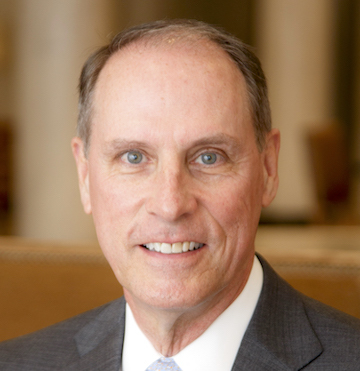
We provide investment banking, research, sales and trading, asset and wealth management, public finance, insurance, private capital, and family office services.
We are a family-owned financial services firm that values client relationships, long-term stability, and supporting the communities where we live and work.
The idea of family defines our culture, because each of us knows that our reputation is on the line as if our own name was on the door.
Our reputation as a leading independent financial services firm is built on the stability of our longstanding and highly experienced senior executives.
We are committed to corporate philanthropy; economic and financial literacy advocacy; and diversity, equity, and inclusion initiatives.
Stephens is proud to sponsor the PGA TOUR, LPGA Tour, and PGA TOUR Champions careers, as well as applaud the philanthropic endeavors, of our Brand Ambassadors.
We host many highly informative meetings each year with clients, industry decision makers, and thought leaders across the U.S. and in Europe.
We provide fiduciary investment strategies to public-and private-sector institutional clients through asset allocation, consulting, and retirement services.
Decades of proven performance and experience in providing tailored fixed income trading and underwriting services to major municipal and corporate issuers.
Proven industry-leading research, global market insights, and client-focused execution.
Customized risk management, property & casualty, executive strategies and employee benefits solutions that protect our clients over the long term.
We assist companies with accessing capital through innovative advisory and execution services that help firms achieve their strategic goals.
We have been a trusted and reliable source of capital for private companies for over 70 years.
Our experienced Private Client Group professionals develop customized investment strategies to help clients achieve their financial goals.
We are a trusted municipal advisor with proven expertise in public financings. We also work with clients in negotiated and competitive municipal underwritings.

The majority of Americans rely upon employer sponsored retirement plans as the foundation for their retirement savings. As an employer, offering the right retirement plan is vitally important for attracting and retaining talented employees.
Here are the top 10 questions that a retirement plan sponsor must ask themselves:
1. Is your company’s retirement plan delivering the best value for your employees?
The quality of your company’s retirement plan can directly impact the quality of its workforce. When in-demand workers have the ability to choose between jobs, many will prioritize the job that offers a stronger retirement plan over the job that offers a higher base salary.
According to a 2023 survey, “participants value retirement to wage dollars at a ratio of 1.6-to-1. On-the-job search model estimates imply that 80% of firms in-sample could improve their recruiting outcomes by increasing 401(k) contributions.”
The survey also found that 50% to 80% of workers, “depending on the condition, will choose a job that offers better retirement benefits, even when that job pays lower total compensation, inclusive of the match and net of tax differences.”
2. Is your plan addressing the risk of cybersecurity threats?
In April 2021, the U.S. Department of Labor’s Employee Benefits Security Administration (EBSA) issued cybersecurity guidance for employee retirement plans. At the time, only 27% of plan sponsors had a written cybersecurity policy.
Last year, more than 600 organizations worldwide suffered cybersecurity data breaches affecting major state pension systems, financial intermediaries, and the data of almost 4 million plan participants. The breaches resulted in the filing of multiple class action lawsuits. This demonstrates why plan fiduciaries have an obligation to ensure proper mitigation of cybersecurity risks.
Plan sponsors should implement processes for addressing and fixing cybersecurity issues, such as identifying possible gaps in the information sharing process with third-party administrators (TPAs) and recordkeepers. Plan fiduciaries should review their service providers’ Reports on Controls SOC-II, and have a cybersecurity risk management strategy in place to address a breach if one were to occur.
3. What is your plan’s employee participation rate, and should it be better?
High employee participation rates are a positive sign for a company’s retirement plan, and low participation rates indicate that a plan may need some changes. Yet “high” and “low” are relative terms. In addition to national averages for all plans, employers can look to more focused figures that capture data on companies operating in a similar size, sector, and locations.
Significant evidence suggests that adopting auto-enrollment for new employees and auto-escalation for employee contributions can boost the total employee participation rate for a company’s retirement plan. This makes sense. People are more likely to continue participation that’s already set up for them, than they are to either set it up themselves or cancel it.
This is one reason why the SECURE 2.0 Act of 2022 requires that, beginning in 2025, 401(k) and 403(b) plans must include auto-enrollment for eligible employees with a default elective deferral rate of 3% to 10%, and new plans generally must provide auto-escalation of 1% per year up to at least 10% and at most 15%.
4. Are your employees deferring enough each year to be ready for retirement?
Ultimately, this is what your company’s retirement plan is all about. Auto-escalation makes it easier for employees to progress toward their retirement goals, but that’s not enough.
The plan’s investment options and various fees must put employees in a position to make sufficient returns, given a reasonable time horizon. Its digital tools must be engaging and user-friendly enough to demonstrate value to employees. And employees must be able to receive crucial information about their plans from professionals, in a timely manner.
All of these features can motivate employees to remain invested, and continue deferring enough, to be ready for retirement.
5. Does your retirement plan offer a competitive Roth option?
Employer sponsored Roth 401(k) plans are gaining in popularity as a complement to traditional 401(k) plans. Both types of plans use automatic payroll deductions. Some employers also offer contribution matches to Roth 401(k)s.
Because employees fund Roth accounts with after-tax dollars, instead of the pre-tax dollars that fund traditional 401(k)s, they may appeal to employees who expect to enter a higher tax bracket in retirement. However, unlike with traditional 401(k)s, contributions to Roth 401(k)s do not reduce an employee’s taxable income.
While employers that offer Roth 401(k)s in addition to traditional 401(k)s can incur greater costs than those that only offer traditional 401(k)s, offering competitive Roth options can make the company more appealing to highly skilled workers and enhance employee retention.
6. Do you know the expenses of your retirement plan, and are they competitive?
There are actually two parts to this question. An employer should know both how much the retirement plan costs the company, and how much the retirement plan costs its employees.
The answer to the first question affects how well the company can support the plan while achieving its strategic business goals. Overly expensive retirement plans can weigh on a company’s capital base and hinder its ability to invest in growth initiatives.
The answer to the second question affects not only how well employees can save for retirement, but also how much fiduciary risk a company may incur. Since 2020, excessive-fee class action lawsuits against 401(k) plan fiduciaries have skyrocketed.
7. Do your employees understand their investment options?
Employees who understand their investment options naturally will be better equipped to make the best use of them. Employers can support this by providing robust financial literacy materials, online courses, and in-person events.
Retirement plans also should offer strong portfolio analysis tools. This encompasses allowing participants to see how much their savings have grown over time, how their savings could grow under various scenarios, their asset allocations, and their investment strategies.
Clarity of language also is essential. Plans should make it easy for participants to understand what’s in their portfolios, from cash and cash equivalents to domestic and international stocks and bonds, as well as whether their strategies are conservative, moderate, or aggressive.
8. Does your current record keeper offer an interactive and intuitive web presence?
Record keepers that provide an interactive interface and intuitive web presence can help boost employee participation rates. Older workers may prefer a streamlined experience, while younger workers may prefer greater customization and functionality.
It is becoming increasingly common for record keepers to provide a mobile app portal that enables participants to check their retirement plans, and make changes, through smartphones. As with all digital platforms, this demands rigorous cybersecurity protections.
For many workers, the quality of the websites and mobile apps that they use are almost as important as the services that those digital platforms provide. In fact, this is how most participants will interact with their retirement plans during their employment.
9. Are you confident that all fiduciary duties are being upheld for your plan?
Although plan advisors and record keepers may assume certain fiduciary duties, every employer that acts as a retirement plan sponsor also has fiduciary duties under the Employee Retirement Income Security Act (ERISA).
These fiduciary duties extend to personal liabilities for executives at an employer, and in some cases may extend well after the individual is no longer an executive. Therefore, always make sure that you are confident that all fiduciary duties are being upheld for your plan.
Fiduciary duties include but are not limited to acting solely in the interest of the participants and their beneficiaries; carrying out duties with the care, skill, and diligence of a prudent person familiar with the matters; and following the plan documents.
10. Is your plan advisor delivering the service that you, the plan sponsor, desire?
Even if on the surface your company’s retirement plan seems good enough, you, the plan sponsor, deserve to trust that your plan advisor is delivering optimal service. After all, optimal service is not just “good enough.” Your plan advisor should continually seek to improve the plan’s efficiency in ways that keep costs down, enrollment high, and participants on track for a financially secure retirement.
Stephens Capital Management (SCM) has specialized knowledge of what is required to deliver an optimal retirement plan, whether your company has five employees or more than 1,000. We work with plan sponsors to manage their fiduciary duties and implement the appropriate processes for plan decision-making. SCM has well-established partner relationships with record keepers and TPAs that result in better levels of service and pricing for our retirement plan clients.
Let SCM help you provide the best retirement plan for your employees, so you – the employer – can attract and retain the best talent for your business.

